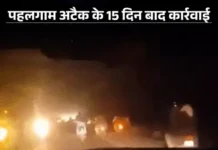
The empty streets of Sector 57 in Gurugram echoed with the footsteps of ten police officers as they stood in front of the Anjuman Jama mosque. The concrete building once used to be a bustling hub of worshippers with a capacity of 450 people, but now it stood covered in debris, garbage, and ashes.
The eerie silence that blanketed the once-bustling mosque in Gurugram was suffocating.
It was as if the brick walls themselves mourned the senseless act of violence that had befallen them. It was no secret that the mosque stood as a beacon of hope and sanctuary for the Muslim community in this predominantly Hindu neighbourhood of India’s capital, New Delhi. However, on that fateful evening of July 31, hatred and bigotry were the unwelcome guests that barged through its doors.
Mohammad Saad was only 22 years old naib deputy imam, he was inside the mosque. When attackers had come under the mosque and killed him. The incident happened hours after a deadly racial riot broke out in the nearby Nuh district of Haryana state.
This attack was revenge for Nuh, the 32-year old who has lived in the area since 2011.
The incident that took place in Nuh during the Hindu religious parade shook the town to its core. It was meant to be a peaceful celebration of religious beliefs, but it turned into a tragedy. The Vishwa Hindu Parishad (VHP) and Bajrang Dal had planned the parade, two far-right organisations allied with the ruling Bharatiya Janata Party (BJP). But as soon as the parade started, chaos ensued.
The scorching sun beat down on the dusty streets of Nuh as chaos engulfed the town. Stones whizzed through the air, breaking windows and denting storefronts as mobs of Hindus clashed with Muslim protestors. The police struggled to maintain order as the violence spread, forcing the government to impose a curfew and shut down the internet to quell the unrest.
It was hard to believe that the town had once been a peaceful oasis, where Hindus and Muslims coexisted without incident. But the recent religious procession had sparked a fiery feud, and tensions had been simmering ever since. As the march snaked through the streets, Muslim men stepped in to halt the procession, citing that the route went too close to a mosque. This proved to be the catalyst for the violence that followed.
The streets of Gurugram and Sohna were painted in chaos as Hindu mobs continued their rampage against Muslim-owned businesses and places of worship. The state of Haryana had deployed additional troops, enforced a strict curfew, and even shut down the internet to curb further unrest, but the fury of the mobs seemed to know no bounds.
Speaking about Gurugram on Tuesday, chaos erupted as violence broke out, leaving several kiosks in ashes. Gurugram Police Commissioner Kala Ramachandran revealed that they had rounded up several men, though none of them were found to be associated with any particular group. While an investigation is still underway, the citizens of Gurugram are left reeling in shock.
Gurugram, often referred to as the “millennium city” for its cosmopolitan vibe and the presence of international organizations, was not immune to the wave of violence that seemed to have swept over the country. The upscale retail malls and office spaces of multinational giants such as Google and Deloitte, situated only a few kilometers away from the sites of the vandalism, bore witness to the rampant destruction.
As the G20 summit draws near, tensions in New Delhi continue to simmer. The recent disturbance in Haryana, where a railway security guard allegedly committed a hate crime, has left many feeling uneasy.
In the days following the incident, social media was flooded with messages of solidarity for the victims. Citizens demanded answers from their leaders, calling for justice and an end to hate crimes. Prime Minister Narendra Modi, however, remained silent on the matter.
As world leaders gather for the G20 summit, the issue is sure to be at the forefront of discussions.
The news of violence in Haryana had spread like wildfire, causing an uneasy feeling amongst the citizens. The Chief Minister, Manohar Lal Khattar, finally broke his silence and spoke to the press. He revealed that 116 individuals have been taken into custody in connection to the chaos.
The scene in Sector 57 of Gurugram was one of fear and sadness as Muslims in the area were left scared and vulnerable following the recent attacks on mosques. The once bustling and vibrant area now lay empty, except for the Anjuman Jama mosque. Its walls, once filled with echoes of prayers and communal gatherings, now only served as a grim reminder of the hatred that had crept into the heart of their community.
Ten police officers were stationed in front of the concrete building, standing guard to prevent any further harm to the worshippers. Their presence, though comforting, could not heal the wounds of those who had lost their loved ones or the trauma that had been inflicted on their minds.
Amidst the rubble and ashes that now covered the mosque, the imam had been killed, leaving the entire Muslim community reeling in shock. Their pain was compounded by the silence of those in power. Khattar, a BJP leader, refused to comment on the tragedy and instead only promised justice for those found guilty.
The conspiracy behind the clashes in Nuh had been uncovered, but it was small comfort to the families of the victims.























































